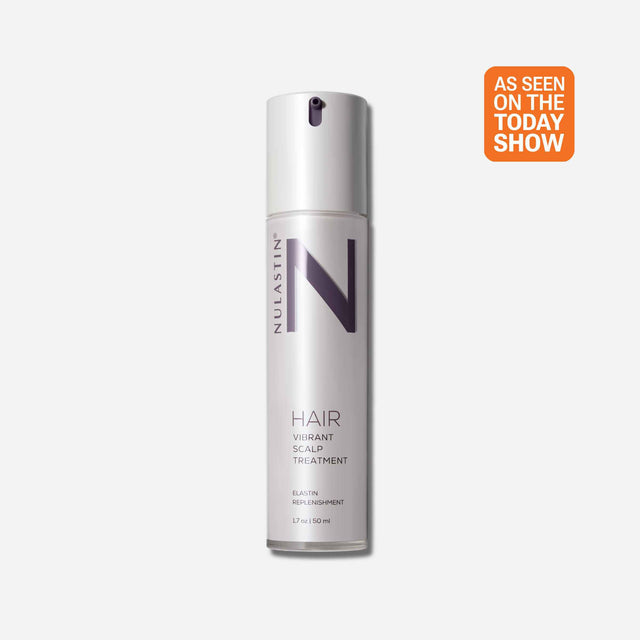Hair falling out in the shower? Brushes looking fuller than usual? It’s easy to panic when shedding seems to ramp up, but let’s start with the facts. It’s normal to lose 50 to 100 hairs a day as part of the natural growth cycle.
Hair loss can happen to anyone, at any age—even in your 20s. In fact, 80% of men and 50% of women will experience some form of hair loss in their lifetime.
With so much misinformation about hair loss, separating fact from fiction can feel overwhelming. That’s why we’re breaking down the myths and getting to the root of what’s really going on. Ready to uncover the truth? Let’s debunk 6 common hair loss myths together.
1. Myth: Hair loss is permanent
There are many different kinds of hair loss, but the good news is that as long as the follicle itself is healthy, regrowth is possible. Things like medications, hormonal shifts and health factors can temporarily increase shedding but rest assured that hair usually bounces back with proper care. Consider this an invitation to schedule some “me” time and invest in a simple but deservedly luxurious daily hair care routine.
How can you tell if your hair follicles are still healthy and capable of producing hair? “A follicle that produces hair and sheds hair normally is considered healthy. The only scientific way to determine if follicles in a “bald spot” are able to produce hair is to study them under a microscope to determine their structural integrity,” says NULASTIN® President and Chief Science Officer, Dr. Felipe Jimenez, PhD.
2. Myth: Hats, buns & ponytails cause permanent hair loss
It’s true that consistently wearing snug hats or pulling your hair into tight buns or ponytails can lead to traction alopecia—hair loss caused by tension. But here’s the good news: it’s usually reversible.
Giving your hair a break with looser, gentler styles can make all the difference. Swap out tight elastics for silk hair ties or claw clips to reduce strain on your strands and protect your roots.
Recovery time from traction alopecia depends on the extent of follicle damage. “For example, if accompanied by redness, swelling, or infection, regrowth may be delayed until the follicle heals,” explains Dr. Jimenez. Treat your scalp kindly, and your hair has a better chance of bouncing back.
3. Myth: Washing your hair too often causes hair loss.
Washing your hair does not cause hair loss. The hair you see falling out in the shower was already in the shedding phase of the hair growth cycle.
However, overwashing can strip the scalp of natural oils, leading to dryness and irritation. On the flip side, keeping your scalp clean and free from buildup can actually promote a healthier environment for hair growth. The key? A balanced routine that supports scalp health without over-stripping.
4. Myth: Wet styling will cause hair loss
This one is a bit nuanced. While wet styling doesn’t necessarily cause hair loss, it can negatively impact hair health and appearance. For example, brushing your hair immediately post-shower can cause breakage, which gives the illusion of thinning. Heat styling can dry both the shaft and the scalp, which can impact the follicles over time. It’s best to wait until your hair is 50-80% dry before turning the blow dryer on and always use a good heat protectant.

5. Myth: You can’t fight genetics when it comes to hair loss
Even if you’re predisposed to male or female pattern baldness, there are ways to avoid, slow or even reverse hair loss as long as your hair follicles are healthy. Start with healthy lifestyle changes like eating a balanced diet, improving sleep hygiene and adopting effective, targeted treatments that nourish your scalp to facilitate new growth.
There is no single definitive cure for male or female pattern baldness but Dr. Jimenez reassures that there are worthwhile options for those struggling. “There are some medical interventions that can help slow the progression of hair loss and may even stimulate sporadic hair regrowth,” he says.
6. Myth: Weight loss leads to better hair health
Many people wrongly assume that lower body weight means improved health and therefore healthier hair and skin. The truth: Body weight alone does not paint a complete picture of overall health. And even if weight loss is your goal, doing so safely is crucial.
The rise in weight loss drugs is causing many to wonder if there’s a correlation in usage and hair shedding. The answer is complicated. It’s not necessarily the drug that causes hair loss, but the speed at which the weight loss occurs. “Rapid weight loss can cause hair growth to slow or may even cause premature hair shedding because of nutritional deficits in protein, vitamins and minerals that promote maintenance of healthy hair. Consuming a balanced diet rich in protein has been shown to help maintain normal hair growth,” says Dr. Jimenez.
Genetics, lifestyle, stress, medications and overall health can all influence the rate of hair loss. It’s normal to experience fluctuations in shedding during different life stages. The good news? Healthy follicles mean there’s potential for renewal.
Our Vibrant Scalp Treatment is designed to support that process. Powered by a proprietary blend of biodesigned proteins and signal peptides, this award winning serum helps minimize premature shedding and promotes fuller-looking hair in 12 weeks, with even greater impact when you keep going.








